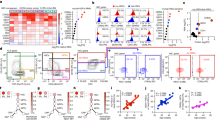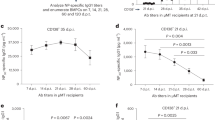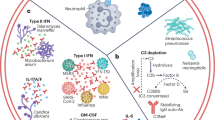Abstract
IMMUNOGLOBULIN E is found in nanogram amounts in normal human and mouse serum. It is increased during parasitic infestations1 and mediates allergy. CD23, the low-affinity receptor for IgE (FccRII), has been proposed as an important regulator of IgE synthesis2–4. The type-II transmembrane lectin4 CD23 is expressed in the mouse on B cells and follicular dendritic cells. In humans there are two forms of CD23 which differ in their intracellular amino-terminal 6/7 amino acids4 expression of the A-form corresponds to that of murine CD23, whereas the B-form is also found on T and other haematopoietic cells4. CD23 has been implicated in cellular adhesion5, antigen presentation6, as a growth and differentiation factor for human B, T and plasma cells, and as a signal transduction molecule7 (reviewed in refs 3, 8). Here we disrupt the gene coding for murine CD23 (ref. 9) to clarify the role of CD23 in vivo and find that B- and T-cell development is normal in these CD23-deficient mice. Immune responses to the helminth Nippostrongylus brasiliensis are unaffected. In contrast, immunization with thymus-dependent antigens leads to increased and sustained specific IgE antibody titres compared with controls. Formation of germinal centres is normal. These results suggest that murine CD23 acts as a negative feedback component of IgE regulation.
This is a preview of subscription content, access via your institution
Access options
Subscribe to this journal
Receive 51 print issues and online access
$199.00 per year
only $3.90 per issue
Buy this article
- Purchase on Springer Link
- Instant access to full article PDF
Prices may be subject to local taxes which are calculated during checkout
Similar content being viewed by others
References
Hagan, P., Blumenthal, U. J., Dunn, D., Simpson, A. J. G. & Wilkins, H. A. Nature 349, 243–245 (1991).
Flores-Romo, L. et al. Science 261, 1038–1041 (1993).
Conrad, D. H. A. Rev. Immun. 8, 623–645 (1990).
Sutton, B. J. & Gould, H. J. Nature 366, 421–428 (1993).
Aubry, J.-P., Pochon, S., Graber, P., Jansen, K. U. & Bonnefoy, J.-Y. Nature 358, 505–507 (1992).
Kehry, M. R. & Yamashita, L. C. Proc. natn. Acad. Sci. U.S.A. 86, 7556–7560 (1989).
Kolb, J.-P. et al. J. Immun. 150, 4798–4809 (1993).
Gordon, J. (ed.) Monogr. Allergy: CD23 29 (Karger, Basel, 1991).
Thomas, K. R. & Capecchi, M. R. Cell 51, 503–512 (1987).
Richards, M. L., Katz, D. H. & Liu, F. T. J. Immun. 147, 1067–1074 (1991).
Ledermann, B. & Bürki, K. Expl Cell Res. 197, 254–258 (1991).
Swendeman, S. & Thorley-Lawson, D. A. EMBO J. 6, 1637–1642 (1987).
Bertho, J.-M., Fourcade, C., Dalloul, A. H., Debré, P. & Mossalayi, M. D. Eur. J. Immun. 21, 1073–1076 (1991).
Adamczewski, M., Köhler, G. & Lamers, M. C. Eur. J. Immun. 21, 617–626 (1991).
Liu, Y.-J., Johnson, G. D., Gordon, J. & MacLennan, I. C. M. Immun. Today 13, 17–21 (1992).
Maeda, K. et al. J. Immun. 148, 2340–2347 (1992).
Heyman, B., Tianmin, L. & Gustavsson, S. Eur. J. Immun. 23, 1739–1742 (1993).
Lebrun, P. & Spiegelberg, H. L. J. Immun. 139, 1459–1465 (1987).
Kopf, M. et al. Nature 362, 245–247 (1993).
Keegan, A. D., Snapper, C. M., Van Dusen, R., Paul, W. E. & Conrad, D. H. J. Immun. 142, 3868–3874 (1989).
Luo, H., Hofstetter, H., Banchereau, J. & Delespesse, G. J. Immun. 146, 2122–2129 (1991).
Sherr, E., Macy, E., Kimata, H., Gilly, M. & Saxon, A. J. Immun. 142, 481–489 (1989).
Saxon, A., Kurbe-Leamer, M., Behle, K., Max, E. E. & Zhang, K. J. Immun. 147, 4000–4006 (1991).
Street, N. E. et al. J. Immun. 144, 1629–1639 (1990).
Campbell, K. A., Lees, A., Finkelman, F. D. & Conrad, D. H. Eur. J. Immun. 22, 2107–2112 (1992).
Sinclair, N. R. StC. Immun. Today 4, 35–36 (1983).
Nitschke, L., Kopf, M. & Lamers, M. C. BioTechniques 14, 914–916 (1993).
Ayane, M. P., Neilsen, P. & Köhler, G. Nucleic Acids Res. 17, 6722 (1990).
Rao, M., Lee, W. T. & Conrad, D. H. J. Immun. 138, 1845–1851 (1987).
Author information
Authors and Affiliations
Rights and permissions
About this article
Cite this article
Yu, P., Kosco-Vilbois, M., Richards, M. et al. Negative feedback regulation of IgE synthesis by murine CD23. Nature 369, 753–756 (1994). https://doi.org/10.1038/369753a0
Received:
Accepted:
Issue Date:
DOI: https://doi.org/10.1038/369753a0
This article is cited by
-
Evaluation of Leukocytes, B and T Lymphocytes, and expression of CD200 and CD23 on B lymphocytes in Patients with Atopic Dermatitis on Dupilumab Therapy—Pilot Study
Dermatology and Therapy (2023)
-
The mechanistic and functional profile of the therapeutic anti-IgE antibody ligelizumab differs from omalizumab
Nature Communications (2020)
-
Structural basis for selective inhibition of immunoglobulin E-receptor interactions by an anti-IgE antibody
Scientific Reports (2018)
-
Structural basis of omalizumab therapy and omalizumab-mediated IgE exchange
Nature Communications (2016)
-
Autonomous membrane IgE signaling prevents IgE-memory formation
Nature Immunology (2016)
Comments
By submitting a comment you agree to abide by our Terms and Community Guidelines. If you find something abusive or that does not comply with our terms or guidelines please flag it as inappropriate.



